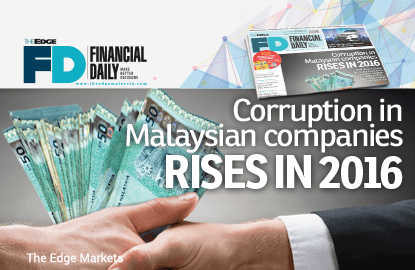
This article first appeared in The Edge Financial Daily, on June 24, 2016.
KUALA LUMPUR: More companies in Malaysia are involved in bribery and corruption, according to PwC’s Global Economic Crime Survey 2016.
Of the companies polled by the audit firm, 30% of them reported losses of over US$100,000 (RM402,000) from economic crime, a rather big jump compared with 19% two years ago, making it the highest among the country’s major trading partners, save for China.
Meanwhile, 13% of the participants said they had lost more than US$1 million from economic crime.
The irony in this, as PwC Consulting Associates (M) Sdn Bhd senior executive director and forensics lead Alex Tan pointed out, was that almost all the Malaysian respondents (98%) felt that their top-level management was sending a clear message that they didn’t condone such crimes.
The findings show 24% of the respondents felt strongly that they had a confidential channel for raising concerns, without fear or retaliation. “That’s good. But you can turn that around and see that 76% of them don’t feel that they have a confidential channel,” he said.
“When we look at the issues of bribery and corruption, we must also take cognisant of the fact that it’s not just a government issue. You have bribery and corruption where [the] private sector pays people in the government sector, and you have people in the private sector bribing each other for contracts.”
The survey was conducted between July 16 and Sept 30 last year, and gathered responses from 17 industries, including government-linked or state-owned enterprises (making up 18% of respondents), financial services (16%), energy, utilities and mining (13%), and manufacturing (12%).
A third of the respondents came from public-listed companies and 28% of them said economic crime had brought an impact on their companies’ share prices.
30% of the participants of the Malaysian survey reported bribery and corruption cases, higher than the global average of 24%. The world average this year has also gone down by three percentage points from 2014, compared with Malaysia, which has jumped by 11 percentage points over the same period.
Malaysia occupies the second spot after China (46%) for the highest percentage of reported bribery among Malaysia’s top three trading partners. Japan had 24% of its organisations reporting cases of corruption, and Singapore 17%.
“While our level of corruption appears to be rising, we also have to be mindful of the fact that the people we trade with also apparently have high levels of corruption. So what do we do as an organisation to mitigate that?” said Tan.
Most of the economic crimes perpetrated within Malaysia’s private sector happened through asset misappropriation, or essentially stealing a company’s available cash or assets. Reported cases for 2016, however, have fallen to 57%, from 65% two years earlier.
Tan said this is the most common form of economic crime done in the world over, which averages at 64% in 2016. Reported procurement frauds in Malaysia stood at 17%, from 19% two years earlier, because it’s one of the ways companies pay out.